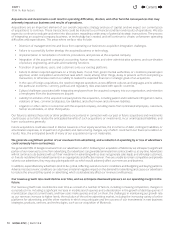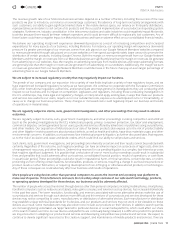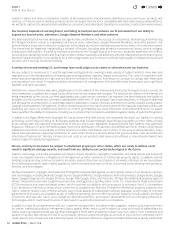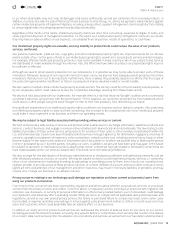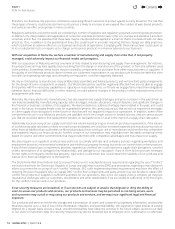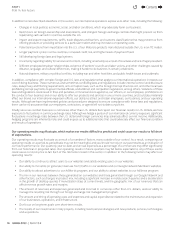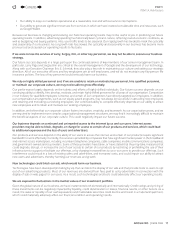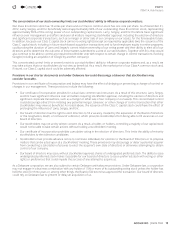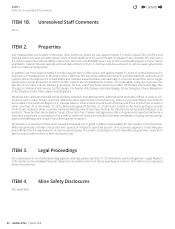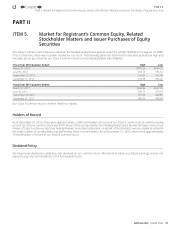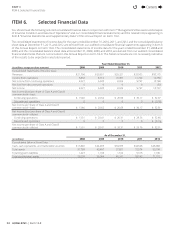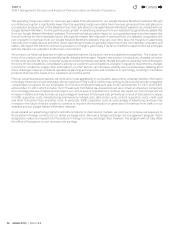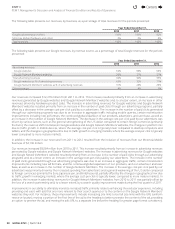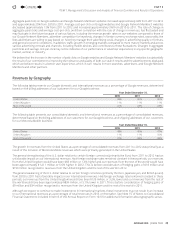Google 2012 Annual Report Download - page 25
Download and view the complete annual report
Please find page 25 of the 2012 Google annual report below. You can navigate through the pages in the report by either clicking on the pages listed below, or by using the keyword search tool below to find specific information within the annual report.
19GOOGLE INC. | Form10-K
PART I
ITEM1A.Risk Factors
The concentration of our stock ownership limits our stockholders’ ability to infl uence corporate matters.
Our Class B common stock has 10 votes per share and our ClassA common stock has one vote per share. As of December31,
2012, Larry, Sergey, and Eric benefi cially owned approximately 92% of our outstanding Class B common stock, representing
approximately 65% of the voting power of our outstanding capital stock. Larry, Sergey, and Eric therefore have signifi cant
infl uence over management and aff airs and over all matters requiring stockholder approval, including the election of directors
and signifi cant corporate transactions, such as a merger or other sale of our company or our assets, for the foreseeable future.
In addition, because our Class C capital stock carries no voting rights (except as required by applicable law), the issuance of the
Class C capital stock, including in future stock-based acquisition transactions and to fund employee equity incentive programs,
could prolong the duration of Larry and Sergey’s current relative ownership of our voting power and their ability to elect all of our
directors and to determine the outcome of most matters submitted to a vote of our stockholders. Together with Eric, they would
also continue to be able to control any required stockholder vote with respect to certain change in control transactions involving
Google (including an acquisition of Google by another company).
This concentrated control limits or severely restricts our stockholders’ ability to infl uence corporate matters and, as a result, we
may take actions that our stockholders do not view as benefi cial. As a result, the market price of our ClassA common stock and,
if issued, our Class C capital stock could be adversely aff ected.
Provisions in our charter documents and under Delaware law could discourage a takeover that stockholders may
consider favorable.
Provisions in our certifi cate of incorporation and bylaws may have the eff ect of delaying or preventing a change of control or
changes in our management. These provisions include the following:
•
Our certifi cate of incorporation provides for a dual class common stock structure. As a result of this structure, Larry, Sergey,
and Eric have signifi cant infl uence over all matters requiring stockholder approval, including the election of directors and
signifi cant corporate transactions, such as a merger or other sale of our company or our assets. This concentrated control
could discourage others from initiating any potential merger, takeover, or other change of control transaction that other
stockholders may view as benefi cial. As noted above, the issuance of the Class C capital stock could have the eff ect of
prolonging the infl uence of Larry, Sergey, and Eric.
•Our board of directors has the right to elect directors to fi ll a vacancy created by the expansion of the Board of Directors
or the resignation, death, or removal of a director, which prevents stockholders from being able to fi ll vacancies on our
board of directors.
•
Our stockholders may not act by written consent. As a result, a holder, or holders, controlling a majority of our capital stock
would not be able to take certain actions without holding a stockholders’ meeting.
•
Our certifi cate of incorporation prohibits cumulative voting in the election of directors. This limits the ability of minority
stockholders to elect director candidates.
•
Stockholders must provide advance notice to nominate individuals for election to the Board of Directors or to propose
matters that can be acted upon at a stockholders’ meeting. These provisions may discourage or deter a potential acquirer
from conducting a solicitation of proxies to elect the acquirer’s own slate of directors or otherwise attempting to obtain
control of our company.
•
Our board of directors may issue, without stockholder approval, shares of undesignated preferred stock. The ability to issue
undesignated preferred stock makes it possible for our board of directors to issue preferred stock with voting or other
rights or preferences that could impede the success of any attempt to acquire us.
As a Delaware corporation, we are also subject to certain Delaware anti-takeover provisions. Under Delaware law, a corporation
may not engage in a business combination with any holder of 15% or more of its outstanding voting stock unless the holder has
held the stock for three years or, among other things, the Board of Directors has approved the transaction. Our board of directors
could rely on Delaware law to prevent or delay an acquisition of us.
4
Contents
4



